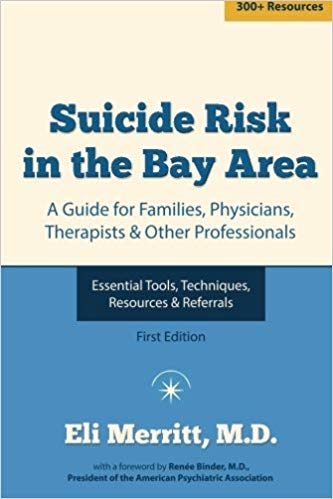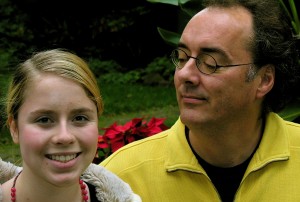by Rona | Aug 22, 2018 | Announcements, Appearances, KPFA, Radio Shows, Uncategorized
1-800-273-8255 National Suicide Prevention Lifeline. If you or someone you know is considering suicide, call this number. The Lifeline provides 24/7 free and confidential support for people in distress, and resources for you and your loved ones.
My guests, Eli Merritt MD, and Esme Shaller, PhD, joined me to discuss the suffering and anguish that is associated with suicide. We addressed the grief, guilt, and shame people feel when someone they love has killed themselves, and also the pain and hopelessness that a person experiences when they are considering suicide.
Talking about suicide is challenging, but it’s vital that we TALK ABOUT IT.
 Eli Merritt, M.D., is the founder of Merritt Mental Health, a mental health and addiction care navigation company that connects patients and family members with best-fit, individualized mental health care nationwide. He is the author of Suicide Risk in the Bay Area: A Guide for Families, Physicians, Therapists, and Other Professionals, and is currently a Visiting Scholar at Vanderbilt University where he is investigating a Unified Theory of Depression. Dr Merritt has previously held positions as president of the San Francisco Psychiatric Society and as an Adjunct Clinical Faculty member at Stanford. He completed a B.A. in history at Yale, M.A. in ethics at Yale, medical degree at Case Western Reserve, medical internship at the Lahey Clinic, and residency in psychiatry at Stanford. He has written on diverse topics in medicine, psychiatry, and medical ethics, including diagnosis, insomnia and depression, addiction, suicide prevention, informed consent, and privacy issues in mental illness. He has taught medical students and resident physicians courses on psychiatric interviewing, ethical standards and boundary violations, the placebo effect, hyperthyroidism, and medical decision-making, among other subjects.
Eli Merritt, M.D., is the founder of Merritt Mental Health, a mental health and addiction care navigation company that connects patients and family members with best-fit, individualized mental health care nationwide. He is the author of Suicide Risk in the Bay Area: A Guide for Families, Physicians, Therapists, and Other Professionals, and is currently a Visiting Scholar at Vanderbilt University where he is investigating a Unified Theory of Depression. Dr Merritt has previously held positions as president of the San Francisco Psychiatric Society and as an Adjunct Clinical Faculty member at Stanford. He completed a B.A. in history at Yale, M.A. in ethics at Yale, medical degree at Case Western Reserve, medical internship at the Lahey Clinic, and residency in psychiatry at Stanford. He has written on diverse topics in medicine, psychiatry, and medical ethics, including diagnosis, insomnia and depression, addiction, suicide prevention, informed consent, and privacy issues in mental illness. He has taught medical students and resident physicians courses on psychiatric interviewing, ethical standards and boundary violations, the placebo effect, hyperthyroidism, and medical decision-making, among other subjects.
Esme Shaller, Ph.D., is an Associate Clinical Professor in the Department of Child Psychiatry at UC San Francisco and in the Department of Psychology at UC Berkeley. She is the director of the Dialectical Behavior Therapy Program at UCSF and the Clinical Director of Outpatient Services for Child Psychiatry. Dr. Shaller’s passion lies in the teaching and dissemination of empirically supported treatments for complex psychological problems, particularly in adolescence. As such, she devotes a large percentage of her time to teaching and training, both within UCSF’s residency and fellowship programs and in the larger Bay Area community. She has worked with other members of her team to implement comprehensive DBT for low income teens in three California Counties. Dr. Shaller received her B.A. in psychology with highest honors from UC Berkeley and her Ph.D. in clinical psychology from the State University of New York, Stony Brook. Subsequently, she completed her psychology internship at the Zucker Hillside Hospital at Long Island Jewish Medical Center in Queens (where she fell in love with DBT!), followed by a postdoctoral fellowship at Kaiser Permanente in South San Francisco. She has been at UCSF since 2007.
by Rona | Feb 29, 2016 | Announcements, KPFA, Podcasts, Radio Shows
The Girl Behind the Door, A Father’s Quest to Understand His Daughter’s Suicide, by John Brooks, provides a profound look into adoption, teenage suicide, and attachment issues.
“When John and Erika’s daughter Casey jumped off of the Golden Gate Bridge in 2008, John began to unravel a heartbreaking truth—Casey had been in pain since birth, living in an Orphanage in Poland until she was adopted at 14 months.”
John spent many years after Casey’s suicide trying to understand what lead to her taking her life. He learned so much—the things he didn’t know, the mistakes he made, and the help he didn’t get from the professional community. He asks, “What did everyone miss? What could have been done differently?”
When you tune in to hear John’s story, you’ll understand more about the struggles children who are adopted face, and the heartache any parent feels when a child’s behavior is out of control, and challenging to understand.

Guests:
John Brooks, a former senior financial executive in the broadcast and media industry, has turned to writing, mental health activism, and volunteer work with teenagers in Marin County. He maintains a blog: parentingandattachment.com to share his experience and educate other adoptive families about parenting and therapy techniques unique to children with attachment disorders.
Nancy Newton Verrier, M.A., is a psychotherapist in private practice in Lafayette, CA, specializing in adoption issues. She is an internationally acclaimed lextureer on the effects of early childhood trauma and deprivation caused by the premature separation of mother and child. She is the author of, Coming Home to Self and The Primal Wound: Understanding the Adopted Child. http://nancyverrier.com/


 Eli Merritt, M.D., is the founder of Merritt Mental Health, a mental health and addiction care navigation company that connects patients and family members with best-fit, individualized mental health care nationwide. He is the author of Suicide Risk in the Bay Area: A Guide for Families, Physicians, Therapists, and Other Professionals, and is currently a Visiting Scholar at Vanderbilt University where he is investigating a Unified Theory of Depression. Dr Merritt has previously held positions as president of the San Francisco Psychiatric Society and as an Adjunct Clinical Faculty member at Stanford. He completed a B.A. in history at Yale, M.A. in ethics at Yale, medical degree at Case Western Reserve, medical internship at the Lahey Clinic, and residency in psychiatry at Stanford. He has written on diverse topics in medicine, psychiatry, and medical ethics, including diagnosis, insomnia and depression, addiction, suicide prevention, informed consent, and privacy issues in mental illness. He has taught medical students and resident physicians courses on psychiatric interviewing, ethical standards and boundary violations, the placebo effect, hyperthyroidism, and medical decision-making, among other subjects.
Eli Merritt, M.D., is the founder of Merritt Mental Health, a mental health and addiction care navigation company that connects patients and family members with best-fit, individualized mental health care nationwide. He is the author of Suicide Risk in the Bay Area: A Guide for Families, Physicians, Therapists, and Other Professionals, and is currently a Visiting Scholar at Vanderbilt University where he is investigating a Unified Theory of Depression. Dr Merritt has previously held positions as president of the San Francisco Psychiatric Society and as an Adjunct Clinical Faculty member at Stanford. He completed a B.A. in history at Yale, M.A. in ethics at Yale, medical degree at Case Western Reserve, medical internship at the Lahey Clinic, and residency in psychiatry at Stanford. He has written on diverse topics in medicine, psychiatry, and medical ethics, including diagnosis, insomnia and depression, addiction, suicide prevention, informed consent, and privacy issues in mental illness. He has taught medical students and resident physicians courses on psychiatric interviewing, ethical standards and boundary violations, the placebo effect, hyperthyroidism, and medical decision-making, among other subjects. 